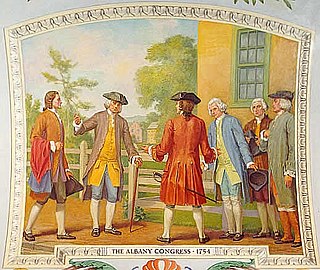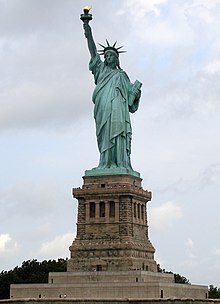
The American Revolution was an ideological and political revolution that occurred in British America between 1765 and 1791. The Americans in the Thirteen Colonies formed independent states that defeated the British in the American Revolutionary War (1775–1783), gaining independence from the British Crown and establishing the United States of America as the first nation-state founded on Enlightenment principles of liberal democracy.
Classical liberalism is a political tradition and a branch of liberalism that advocates free market and laissez-faire economics; civil liberties under the rule of law with especial emphasis on individual autonomy, limited government, economic freedom, political freedom and freedom of speech. It gained full flowering in the early 18th century, building on ideas stemming at least as far back as the 13th century within the Iberian, Anglo-Saxon, and central European contexts and was foundational to the American Revolution and "American Project" more broadly.

The Nine Nations of North America is a 1981 book by Joel Garreau, in which the author suggests that North America can be divided into nine nations, which have distinctive economic and cultural features. He also argues that conventional national and state borders are largely artificial and irrelevant, and that his "nations" provide a more accurate way of understanding the true nature of North American society. The work has been called "a classic text on the current regionalization of North America".

The Albany Congress, also known as the Albany Convention of 1754, was a meeting of representatives sent by the legislatures of seven of the 17 British colonies in British America: Connecticut, Maryland, Massachusetts, New Hampshire, New York, Pennsylvania, and Rhode Island. Those not in attendance included Newfoundland, Nova Scotia New Jersey, Virginia, Georgia, North Carolina, and South Carolina. Representatives met daily at the City Hall in Albany, New York, from June 19 to July 11, 1754, to discuss better relations with the Native American tribes and common defensive measures against the French threat from Canada in the opening stage of the French and Indian War, the North American front of the Seven Years' War between Great Britain and France.

The colonial history of the United States covers the history of European colonization of North America from the early 17th century until the incorporation of the Thirteen Colonies into the United States of America, after the War of Independence. In the late 16th century, England, Kingdom of France, Spanish Empire, and the Dutch Republic launched major colonization programs in North America. The death rate was very high among early immigrants, and some early attempts disappeared altogether, such as the English Lost Colony of Roanoke. Nevertheless, successful colonies were established within several decades.

American exceptionalism is the idea that the United States is inherently different from other nations. Proponents of it argue that the values, political system, and historical development of the U.S. are unique in human history, often with the implication that it is both destined and entitled to play a distinct and positive role on the world stage.

The term Latin America primarily refers to the Spanish- and Portuguese-speaking countries in the New World.
Louis Hartz was an American political scientist and influential liberal proponent of the idea of American exceptionalism.

The American Enlightenment was a period of intellectual ferment in the thirteen American colonies in the 18th to 19th century, which led to the American Revolution, and the creation of the United States of America. The American Enlightenment was influenced by the 17th-century European Enlightenment and its own native American philosophy. According to James MacGregor Burns, the spirit of the American Enlightenment was to give Enlightenment ideals a practical, useful form in the life of the nation and its people.

The values, ideals and concept of Republicanism have been discussed and celebrated throughout the history of the United States. As the United States has no formal hereditary ruling class, Republicanism in this context does not refer to a political movement to abolish such a class, as it does in countries such as the UK, Australia, and Netherlands. Instead, it refers to the core values that citizenry in a republic have, or ought to have.

Centre-right politics lean to the right of the political spectrum, but are closer to the centre. From the 1780s to the 1880s, there was a shift in the Western world of social class structure and the economy, moving away from the nobility and mercantilism, towards capitalism. This general economic shift toward capitalism affected centre-right movements, such as the Conservative Party of the United Kingdom, which responded by becoming supportive of capitalism.
Modern liberalism in the United States, often simply referred to in the United States as liberalism, is a form of social liberalism found in American politics. It combines ideas of civil liberty and equality with support for social justice and a "checked-and-validated" market economy. Economically, modern liberalism opposes cuts to the social safety net and supports a role for government in reducing inequality, providing education, ensuring access to healthcare, regulating economic activity and protecting the natural environment. This form of liberalism took shape in the 20th century United States as the voting franchise and other civil rights were extended to a larger class of citizens. Major examples of modern liberal policy programs include the New Deal, the Fair Deal, the New Frontier, and the Great Society.
Liberalism in the United States is a political and moral philosophy based on concepts of unalienable rights of the individual. The fundamental liberal ideals of freedom of speech, freedom of the press, freedom of religion, the separation of church and state, the right to due process and equality under the law are widely accepted as a common foundation of liberalism. It differs from liberalism worldwide because the United States has never had a resident hereditary aristocracy and avoided much of the class warfare that characterized Europe. According to Ian Adams: "Ideologically, all US parties are liberal and always have been. Essentially they espouse classical liberalism, that is a form of democratised Whig constitutionalism plus the free market. The point of difference comes with the influence of social liberalism" and the proper role of government.

Daniel Judah Elazar was a political scientist known for his seminal studies of political culture of the US states. He was professor of political science at Bar-Ilan University in Israel and Temple University in Pennsylvania, and director of the Center for the Study of Federalism at Temple University and the founder and president of the Jerusalem Center for Public Affairs.
Politics is the process by which groups of people make decisions. Although the term is generally applied to behavior within civil governments, politics is observed in all human group interactions, including corporate, academic, and religious institutions. Politics consists of "social relations involving authority or power. The definition of "politics" from "The Free Dictionary" is the study of political behavior and examines the acquisition and application of power. Politics study include political philosophy, which seeks a rationale for politics and an ethic of public behavior, and public administration, which examines the practices of governance.
Liberalism is a political and moral philosophy based on the rights of the individual, liberty, consent of the governed and equality before the law. Liberals espouse various views depending on their understanding of these principles. However, they generally support private property, market economies, individual rights, liberal democracy, secularism, rule of law, economic and political freedom, freedom of speech, freedom of the press, and freedom of religion.
Liberalism, the belief in freedom, equality, democracy and human rights, is historically associated with thinkers such as John Locke and Montesquieu, and with constitutionally limiting the power of the monarch, affirming parliamentary supremacy, passing the Bill of Rights and establishing the principle of "consent of the governed". The 1776 Declaration of Independence of the United States founded the nascent republic on liberal principles without the encumbrance of hereditary aristocracy—the declaration stated that "all men are created equal and endowed by their creator with certain unalienable rights, among these life, liberty, and the pursuit of happiness". A few years later, the French Revolution overthrew the hereditary aristocracy, with the slogan "liberty, equality, fraternity" and was the first state in history to grant universal male suffrage. The Declaration of the Rights of Man and of the Citizen, first codified in 1789 in France, is a foundational document of both liberalism and human rights, itself based on the U.S. Declaration of Independence written in 1776. The intellectual progress of the Enlightenment, which questioned old traditions about societies and governments, eventually coalesced into powerful revolutionary movements that toppled what the French called the Ancien Régime, the belief in absolute monarchy and established religion, especially in Europe, Latin America and North America.
Progressivism is a way of thinking that holds that it is possible through political action for human societies to improve over time. As a political movement, progressivism purports to advance the human condition through social reform based on advancements in science, technology, economic development, and social organization. Adherents to this way of thinking hold that progressivism has universal application and endeavour to spread this idea to human societies everywhere. Progressivism arose during the Age of Enlightenment out of the belief that civility in Europe was improving due to the application of new empirical knowledge to the governance of society.
Liberalism is a school of thought within international relations theory which revolves around three interrelated principles:










